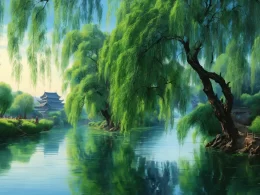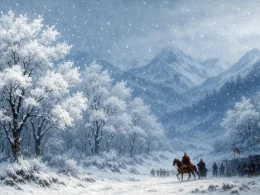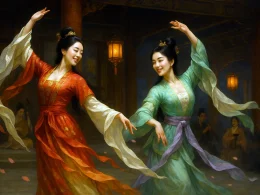A lofty man should benefit four seas,
But I’d enjoy till old a life of ease.
I’d have my kinsmen under the same roof,
And all my children safe and sound, harm-proof.
I croon and play my lute morning or night;
My wine cup never dried affords delight.
Freely I’d drink my fill with loose belt ties;
Early I’d go to bed and late to rise.
Can I be like those who would climb up higher,
Worried for gain and loss like ice and fire?
All will be buried in the grave in time.
Why should we care for glory, though sublime!
Original Poem
「杂诗 · 其四」
陶渊明
丈夫志四海,我愿不知老。
亲戚共一处,子孙还相保。
觞弦肆朝日,樽中酒不燥。
缓带尽欢娱,起晚眠常早。
孰若当世时,冰炭满怀抱。
百年归丘垄,用此空名道!
Interpretation
Miscellaneous Poems IV was composed around 414 AD when Tao Yuanming was approximately fifty years old. The poet reflects on his youthful aspirations to achieve greatness across the land, now finding himself in twilight years with unfulfilled ambitions, inevitably giving rise to profound reflections. During his rural retreat, while enjoying family reunions and tranquil simplicity, he simultaneously grieves over time's swift passage and unrealized dreams. This poem represents a soliloquy born from such complex emotions.
First Stanza: "丈夫志四海,我愿不知老。"
Zhàng fū zhì sì hǎi, wǒ yuàn bù zhī lǎo.
A true man's will spans four seas,
I once hoped never to age.
The opening recalls youthful ambitions, radiating vitality and heroic spirit.
Second Stanza: "亲戚共一处,子孙还相保。"
Qīn qī gòng yī chù, zǐ sūn hái xiāng bǎo.
Kin gathered together,
Descendants watching each other.
Portrays an idealized post-retirement life, valuing family harmony and peaceful existence.
Third Stanza: "觞弦肆朝日,樽中酒不燥。"
Shāng xián sì zhāo rì, zūn zhōng jiǔ bù zào.
At dawn, strings play as wine cups pass,
Never drying our shared glass.
Depicts contented pastoral life where music and wine become spiritual sustenance.
Fourth Stanza: "缓带尽欢娱,起晚眠常早。"
Huǎn dài jìn huān yú, qǐ wǎn mián cháng zǎo.
Loose robes embrace simple pleasure,
Rising late, retiring with leisure.
Further outlines carefree reclusive days, showing harmony with nature's rhythms.
Fifth Stanza: "孰若当世时,冰炭满怀抱。"
Shú ruò dāng shì shí, bīng tàn mǎn huái bào.
Unlike contemporaries' plight,
Ice and charcoal fill their night.
Satirizes worldly conflicts between fame-seeking and inner turmoil, contrasting with his detachment.
Sixth Stanza: "百年归丘垄,用此空名道!"
Bǎi nián guī qiū lǒng, yòng cǐ kōng míng dào!
Century's end returns to clay,
What use this vain fame's display!
States life's inevitable earthly return, rejecting empty reputation, embracing authentic simplicity.
Holistic Appreciation
"Miscellaneous Poems No.4" reveals the poet's inner transformation through contrasting youthful ambitions with reclusive serenity. The first half celebrates familial harmony and rural contentment with serene joy, while the latter satirizes worldly fame-chasing to highlight his transcendent detachment. Containing both lament for lost dreams and praise for natural living, the poem blends heroic spirit with wise composure, embodying Tao Yuanming's characteristic naturalism and philosophical freedom.
Artistic Merits
The poem employs straightforward language to reveal profound contradictions and transcendence through life scenes and emotional shifts. Unadorned yet meaningful, emotions flow naturally within simplicity. Particularly through dual contrasts - between youthful aspirations and present reality, and between worldly vanity and pastoral authenticity - it profoundly expresses the poet's unique understanding of life and human affairs. The style blends lucid tranquility with deep feeling, standing as quintessential Tao Yuanming reclusive poetry.
Insights
This poem enlightens us that while youth carries grand ambitions, we must learn to embrace life's natural transitions toward inner peace. Facing mortality and fame's emptiness, maintaining authenticity while cherishing family bonds and nature's beauty becomes essential. As Tao Yuanming shows, when all ultimately return to earth, rather than clinging to fame's contradictions, we should find contentment in simplicity and live truthfully. Meeting life's impermanence with serene resilience constitutes life's wisest choice.
Poem translator
Xu Yuanchong (许渊冲)
About the poet

Tao Yuanming(陶渊明), 365 – 427 CE, was a poet, literary figure, fu writer, and essayist active during the late Eastern Jin and early Liu Song dynasties. Born in Chaisang (near present-day Jiujiang, Jiangxi Province), he pioneered a new genre of pastoral-themed literature, expressing profound philosophical insights through simple language. His poetic style became an enduring aesthetic standard in classical Chinese poetry.












